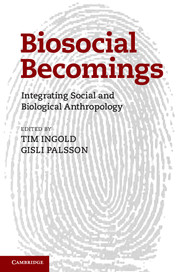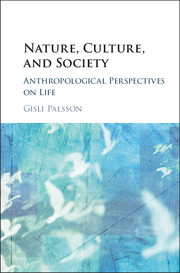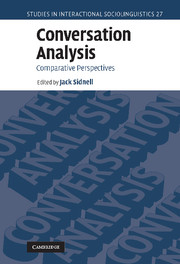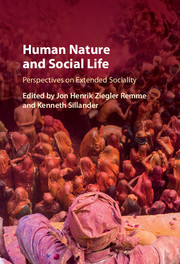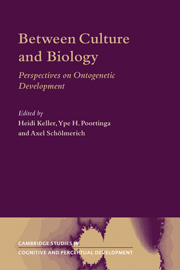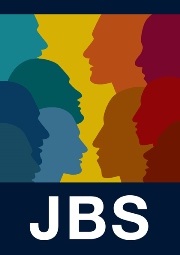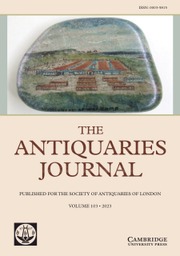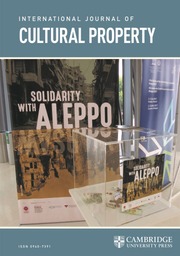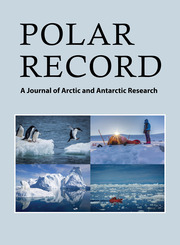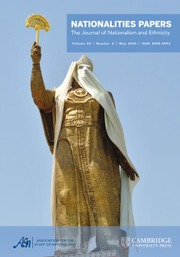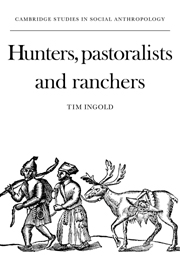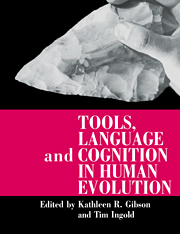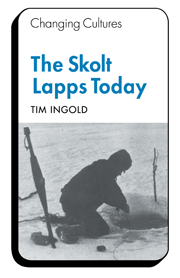Biosocial Becomings
Integrating Social and Biological Anthropology
$104.00 USD
- Editors:
- Tim Ingold, University of Aberdeen
- Gisli Palsson, University of Iceland, Reykjavik
- Date Published: No date available
- availability: This ISBN is for an eBook version which is distributed on our behalf by a third party.
- format: Adobe eBook Reader
- isbn: 9781107439450
Find out more about Cambridge eBooks
$
104.00 USD
Adobe eBook Reader
Other available formats:
Hardback
Looking for an inspection copy?
This title is not currently available on inspection
-
All human life unfolds within a matrix of relations, which are at once social and biological. Yet the study of humanity has long been divided between often incompatible 'social' and 'biological' approaches. Reaching beyond the dualisms of nature and society and of biology and culture, this volume proposes a unique and integrated view of anthropology and the life sciences. Featuring contributions from leading anthropologists, it explores human life as a process of 'becoming' rather than 'being', and demonstrates that humanity is neither given in the nature of our species nor acquired through culture but forged in the process of life itself. Combining wide-ranging theoretical argument with in-depth discussion of material from recent or ongoing field research, the chapters demonstrate how contemporary anthropology can move forward in tandem with groundbreaking discoveries in the biological sciences.
Read more- Advances a new biosocial synthesis, demonstrating by example how contemporary thinking in social and cultural anthropology chimes with the latest discoveries in biology
- Aims to break down existing barriers between biological and social-cultural anthropology, enabling a more effective understanding and interaction between fields
- Combines wide-ranging theoretical argument with in-depth discussion of recent and ongoing research, providing both a clear explanation of the approach and detailed evidence of how it can be applied in practice
Reviews & endorsements
'In this ambitious and highly original volume, Ingold and Palsson try to lead anthropology toward a fundamental rethinking of the static dichotomy of biology and culture. Challenging the assumptions of nineteenth-century biology, which are often still taken as axiomatic - that human skin is a boundary between the autonomous natural world of the organism and the exogenous cultural and ecological setting in which the human being is embedded - the contributors invite you to blur those categorical distinctions with modern data and theory. Instead they present humans as 'becomings' - as parts of continually unfolding biosocial relationships with other humans, and other species. To a scientist who is trying to comprehend a bipedal, linguistic creature that nevertheless takes several years before it can even move and communicate properly, this makes a good deal of sense … an intellectually very rewarding work.' Jonathan Marks, University of North Carolina, Charlotte
See more reviews'Biosocial Becomings is a thought-provoking collection of essays on the current re-negotiation of the boundaries between the biological and the social in the study of humans. The subtitle of the book promises a new integration of social and biological anthropology after a long century of divorce. It does more: it explores a conceptual space that is no longer dominated by the dichotomy between nature and culture.' Hans-Jörg Rheinberger, Max Planck Institute for the History of Science
'The essays included in the book are highly informative and inspiring. I am pleased that the authors actually build upon an interdisciplinary approach. The texts are based not only on findings and theories of social and biological anthropology, but the authors also benefit from various concepts of philosophy, psychology, and other scientific fields. Biosocial Becomings is a highly original volume including inspiriting texts. I personally find [it] groundbreaking, because it is really an effort to restore connection of social and biological anthropology.' Martin Soukup, Anthropos
'… an interesting and thought-provoking read for those of us ready to engage in debate with our colleagues in social anthropology.' Siân Waters, Primate Eye
Customer reviews
17th Oct 2024 by UName-133808
Biosocial Becomings 2013, addresses several pressing contemporary themes, that have already received attention in anthropology and related disciplines such as cultural studies and sociology, all of which somehow relate to the separation of the social world, on the one hand, and, on life or bios on the other. Advancing a “biosocial” understanding of humans, it poses a serious challenge to current gene talk and neo-Darwinian theory. The book offers an invitation to explore more thoroughly how the study of life could be developed and advanced, rejecting those dualisms of the past and assuming worlds of ‘becoming’ rather than ‘being’ with cognizance of the ensembles or entanglements of relations that are implicated in a complex and multiplicit venture. This volume boldly attends to that call especially Pálsson and Ramirez-Goicoechea’s work on epigenetics, Chapters 2, 4 &12, and argues for an integration of “two radically separated subfields of biological-physical and social-cultural anthropology” vii, dissolving tensions between gene theory and meme theory and avoiding the biosocial colonisation of one over the other. The collection reimagines creatures of all kinds not ‘for what they are, but of what they do’ 8 with several chapters re-drawing Bourdieu’s notion of habitus, field and agency to good effect, along with an astute anthropological reconsideration of Deleuze’s work on becomings a productive text for both Anthropology and Cultural Studies. Dr Shé Mackenzie HAWKE Department of Gender and Cultural Studies The University of Sydney
Review was not posted due to profanity
×Product details
- format: Adobe eBook Reader
- isbn: 9781107439450
- contains: 16 b/w illus. 1 table
- availability: This ISBN is for an eBook version which is distributed on our behalf by a third party.
Table of Contents
Preface
1. Prospect Tim Ingold
2. Ensembles of biosocial relations Gisli Palsson
3. Blurring the biological and social in human becomings Agustin Fuentes
4. Life-in-the-making: epigenesis, biocultural environments and human becomings Eugenia Ramirez-Goicoechea
5. Thalassemic lives as stories of becoming: mediated biologies and genetic (un)certainties Aglaia Chatjouli
6. Shedding our selves: perspectivism, the bounded subject and the nature-culture divide Noa Vaisman
7. Reflections on a collective brain at work: one week in the working life of an NGO-team in urban Marocco Barbara Elisabeth Götsch
8. The habits of water: marginality and the sacralization of non-humans in North-Eastern Ghana Gaetano Mangiameli
9. 'Bringing wood to life': lines, flows and materials in a Swazi sawmill Vito Laterza, Bob Forrester and Patience Mususa
10. Humanity and life as the perpetual maintenance of specific efforts: a reappraisal of animism Istvan Praet
11. Ravelling/unravelling: being-in-the-world and falling-out-of-the-world Hayder Al-Mohammad
12. Retrospect Gisli Palsson
Notes on the contributors
References
Index.
Sorry, this resource is locked
Please register or sign in to request access. If you are having problems accessing these resources please email [email protected]
Register Sign in» Proceed
You are now leaving the Cambridge University Press website. Your eBook purchase and download will be completed by our partner www.ebooks.com. Please see the permission section of the www.ebooks.com catalogue page for details of the print & copy limits on our eBooks.
Continue ×Are you sure you want to delete your account?
This cannot be undone.
Thank you for your feedback which will help us improve our service.
If you requested a response, we will make sure to get back to you shortly.
×
